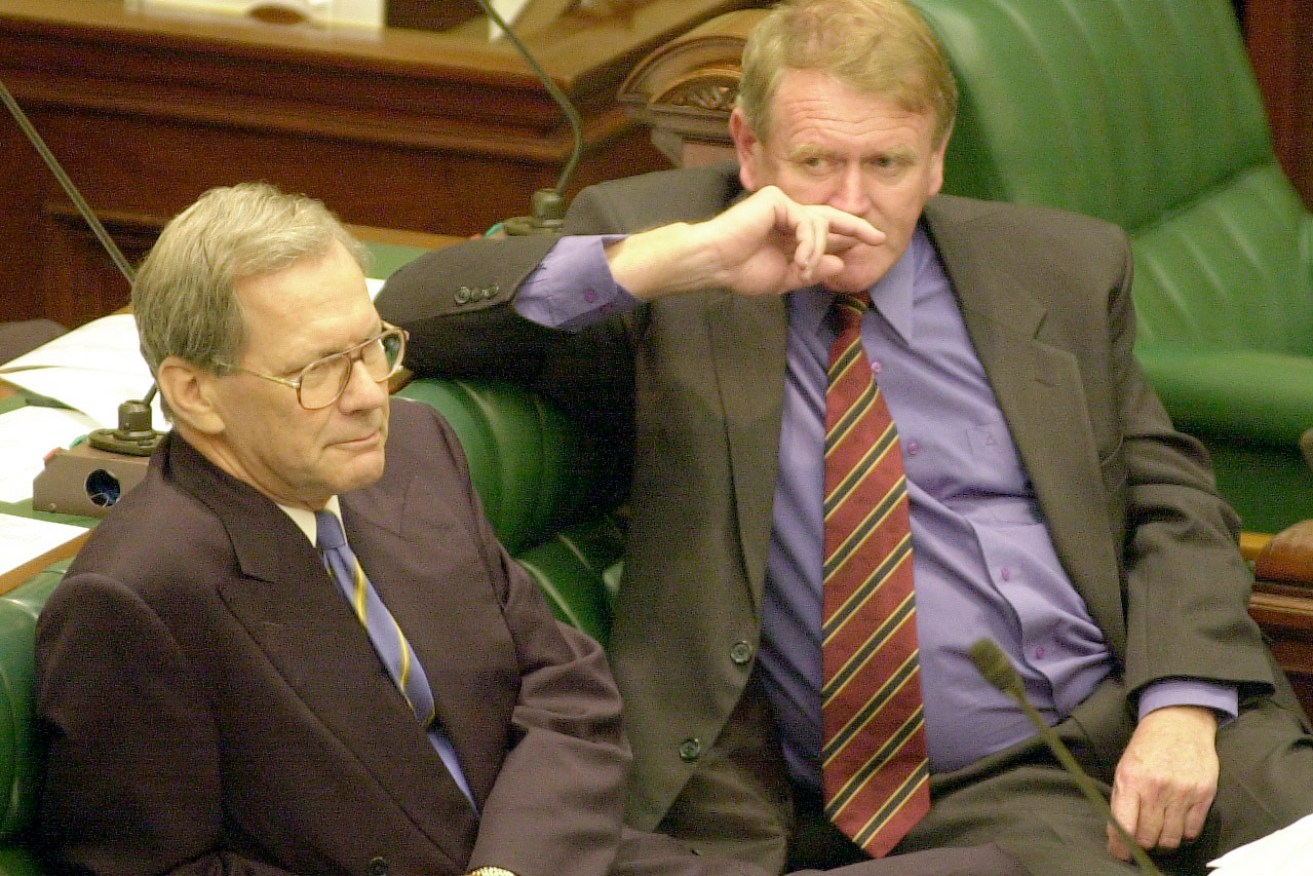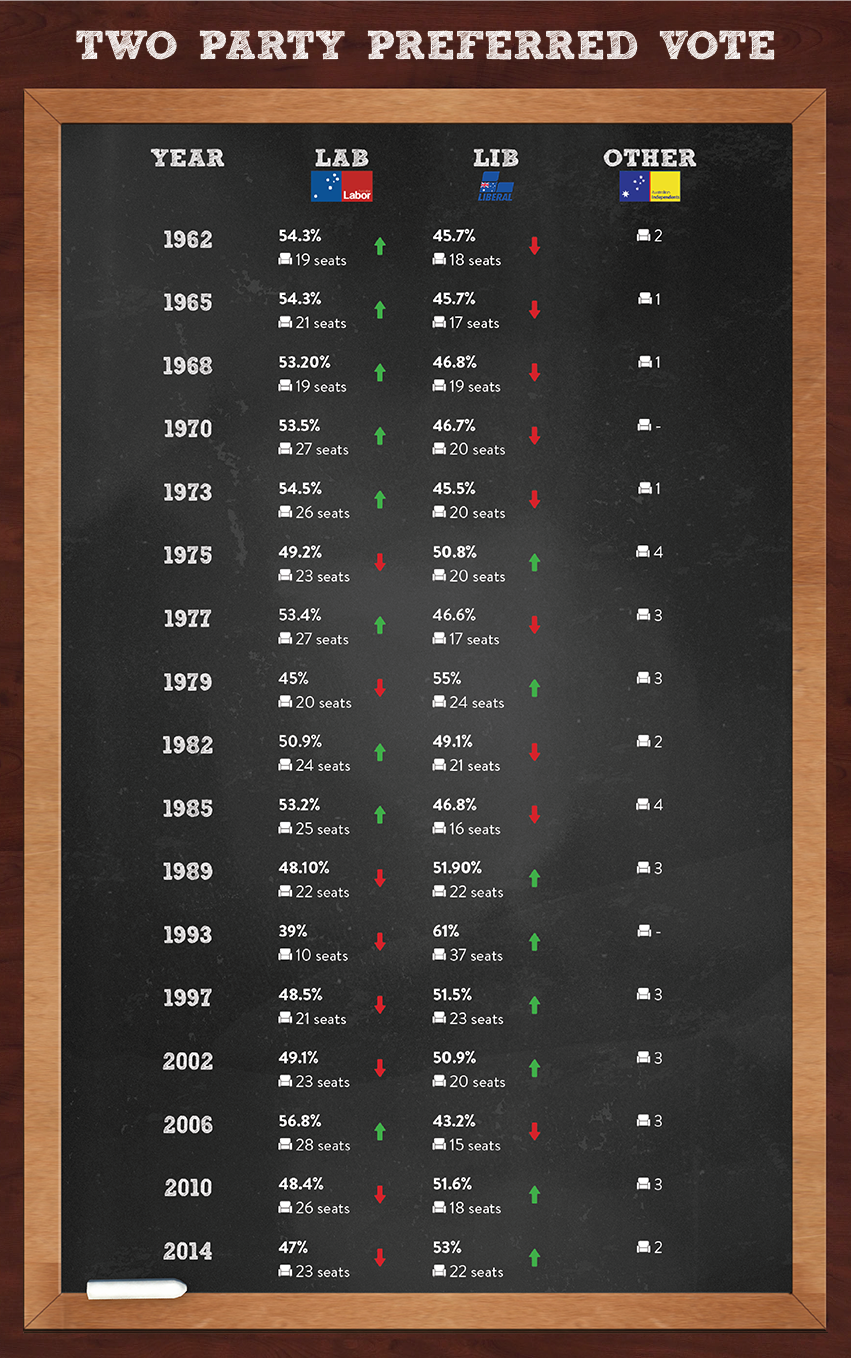REVEALED: The decision that cost the Libs a generation in power
The South Australian Liberal Party effectively cost itself government in at least three of the last four elections because it ignored the recommendation of a parliamentary committee to consider electoral reforms that would ensure the party with a statewide majority holds power, InDaily can reveal.

Dean Brown (left) who led the Liberals to government in 1993, and Rob Kerin, Premier when this photo was taken in 2002. Photo: AAP Image/Tom Miletic
The revelation comes as a member of the inquiry that drafted the state’s now-infamous “fairness clause” tells InDaily “it was never going to work”.
The 1990 report of a select committee to examine electoral reform – established after the Liberals failed to win a majority of seats in 1989 despite snaring 51.9 per cent of the two-party vote – considered adopting a semi-proportional “top-up” system that would see additional MPs elected to ensure the party with a statewide majority has a similar majority in parliament.
And it recommended “that the top-up option be reviewed following the first general election held after the implementation of these recommendations”.
Former Labor and independent MP Terry Groom was one of five members of the committee – along with then deputy Premier Don Hopgood, independent Labor MP Martyn Evans and two senior Liberals.
Groom recalls Evans advocated for a complete overhaul of the electoral system to proportional representation, while the Liberal members were pushing for the insertion of the “fairness clause” that would “ensure as far as practicable” that the party with more than 50 per cent of the popular vote “will be elected in sufficient numbers to enable a government to be formed”.
“We told them this fairness criteria wouldn’t work,” Groom said.
“It wasn’t going to work as long as you had single member electorates… the only way to achieve that was the top-up system [but] we couldn’t get a consensus on that.”
They’re the authors of their own predicament, and it’s no use blaming the Commission or the boundaries
Nonetheless, the committee still recommended that the top-up option be revisited after 1993, but in the wake of the failed State Bank “the Liberals got such a big majority, they were never interested in this”.
Prominent Liberals, including former leader Iain Evans and current backbencher Stephan Knoll, have recently advocated a top-up system as a means of delivering electoral fairness.
But Groom says the party should have introduced such a system after 1993.
“They’re the authors of their own predicament, and it’s no use crying wolf and blaming the [Electoral] Commission or the boundaries – the fact is while we’ve got single member electorates, the two-party criteria is just not going to work… and that’s what happened in the 2014 election.”
Groom’s recollections are significant as the Electoral Districts Boundaries Commission continues its review of the state’s electoral map, with academic Clem Macintyre telling a recent hearing that a simple way to address the problem could be cut into nominally safe Liberal seats such as Bragg, Unley and Waite, which abut Labor marginals like Ashford and Elder.
“I don’t think it would take a lot of movement to move some of those Liberal voters out [into the Labor seats]… that would be where I’d probably begin my thinking,” Macintyre told the hearing.
But Groom says the committee’s “underlying assumption” was that both parties began with “roughly” the same number of safe seats each, “leaving the marginals as the battleground”.
“If all the seats were marginal, you could – in big swings – have a winner take all situation… this is one of the difficulties now faced in redrawing the boundaries,” he argues.
Groom has crunched the numbers for every election dating back to the 1960s, and argues the long-term trend suggests a fairness clause was always doomed to fail.
“This was just never going to work, when you look back at the two-party preferred results,” he said.
“When you look at the two-party preferred vote over a period of time – apart from strong movements such as in 1977, 1979 , 1985, 1993 and 2006 – it settles back to one or two seats either way,” he noted.
“So the selection of candidates and the sitting member advantage becomes critical in the tight elections. Labor tends to put its resources into the seats to gain the 24 needed [whereas] last election I saw all these Liberal posters up in Bragg, for example, and thought: ‘What a waste!’.”
Groom said the Liberals’ superior statewide vote in 2010 was such that “they should have formed Government, but their selection of candidates in at least a couple of seats was the problem”.
“A good local member is worth 3 to 5 per cent of the vote to start with,” he said.
“They should have formed Government then, but in single member electorates the commission can’t factor in the popularity of the local member.”
He argues the same held true back in 1975, and that it was the Liberals’ own travails – rather than a loaded electoral system – that prevented them cutting short Don Dunstan’s reign.
“This was the election that Dunstan nearly lost – the Labor vote was 49.2 and the Liberal vote was 50.8… if Steele Hall, having brought down a reasonable boundaries distribution, hadn’t fallen out with the Liberals and formed the Liberal Movement, he would have – on personality – been Premier in 1975.
“They would have formed Government in 1975 and probably would have won again in ’77… and that’s the impact of personality when you have single member constituencies.”
He said despite Liberal entreaties for the current electoral system – which sees regular boundary redistributions aligned to the fairness clause – “we really didn’t want the redistribution after [every] election, because it made the party system dysfunctional”.
“What we predicted then has come true… we all knew it was not going to work [and] the Libs had all that time in office to review the criteria… but they didn’t do so as it suited them at the time.”
Yep, that was an error!
Iain Evans told InDaily he was aware that the committee had recommended reviewing top-ups but that his party had not done so.
“Yep, that was an error,” he said.
“But what it shows is there was bipartisan support for the concept.”
He said while the Liberals should have reviewed the principle in 1993, Labor should also have done so while in office.
“Both sides are at fault, and the person that’s missing out is the voter,” he said.





